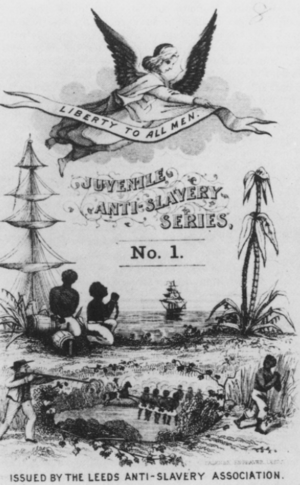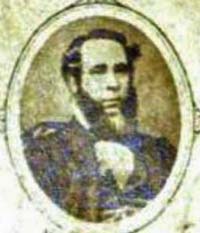Leeds Anti-Slavery Association facts for kids

Juvenile Anti-Slavery Series published by Leeds Anti-Slavery Association
|
|
| Founder(s) | Wilson Armistead |
|---|---|
| Founded | 1853 |
The Leeds Anti-Slavery Association was a group formed in Leeds, England, in 1853. Its main goal was to end slavery. This association was special because it was one of the first groups of its kind to let women join and even hold important roles on its committee. It was founded by Wilson Armistead. The group was active in Leeds and Yorkshire in England, and also in North America. They sent out many pamphlets (small booklets) to people on the east coast of the United States to spread their anti-slavery message.
Contents
How the Association Started
The Leeds Anti-Slavery Association began in 1853. It was started by Wilson Armistead, who was a Quaker and a strong supporter of ending slavery. Quakers are a religious group known for their peaceful beliefs and their work for social justice. Armistead had traveled to America to see for himself what life was like for enslaved people. He also met with other people who wanted to end slavery there.
Armistead was a well-known abolitionist. In 1848, he published a book called A Tribute for the Negro. This book shared stories and information about Black people, aiming to show their humanity and argue against slavery.
Women's Important Roles
This association was groundbreaking because it allowed women to be very active in its campaigns. Both women and men served as officers and committee members. In fact, most of the people who joined the association were women. For example, Mary Bragg, who was Wilson Armistead's wife, was the librarian for the group.
Famous Speakers and Meetings
The Leeds Anti-Slavery Association organized many meetings. They invited famous people who were fighting against slavery to speak. These speakers included Harriet Beecher Stowe, who wrote the famous book Uncle Tom's Cabin, and Samuel Ringgold Ward, a powerful speaker and abolitionist.
Spreading the Message
The association had its own journal. This journal published stories about what it was like to be enslaved and shared texts that supported the end of slavery.
The Leeds Anti-Slavery Series
One of their main ways to spread their message was through the Leeds Anti-Slavery Series. This was a collection of 82 anti-slavery pamphlets. A historian named Kimberly Blockett said these pamphlets were not just for readers in England. Instead, they were meant to flood "the eastern shores of the United States with a half million prints of anti-slavery sentiments from England." This means they wanted to send a huge number of these booklets to America to influence people there. The association also put all these publications together into one book.
For Younger Readers
The association also published the Leeds Anti-Slavery Juvenile Series. This series was specially made for children, helping them understand why slavery was wrong. Wilson Armistead used his own business in Holbeck, called Water Hall, as a place to send out all these anti-slavery pamphlets.
Essay Competition
In 1854, the association held an essay competition. They offered big prizes of 200 guineas and 100 guineas for the best essays. People had to write about "On the sinfulness of slavery, the mode of terminating it and the benefits that would result therefrom." This topic encouraged people to think deeply about why slavery was wrong, how to end it, and the good things that would happen if it ended.
More Notable Speakers
The association continued to host talks and meetings with important abolitionists. Harriet Beecher Stowe, the author, even stayed at the home of Edward Baines when she visited. On December 10, 1855, a meeting was held at Belgrave Chapel. Speakers there included Parker Pillsbury, an American abolitionist.
Leeds had a history of hosting anti-slavery speakers even before this association. For example, Frederick Douglass, a formerly enslaved person who became a famous writer and speaker, gave a lecture in Leeds on December 23, 1846. His talk was called "England Should Lead the Cause of Emancipation."
Youth Involvement
In 1857, the Leeds Anti-Slavery Association helped create the Leeds Young Men's Anti-Slavery Society. Wilson Armistead was the Honourable Secretary for this new group, showing his continued dedication to involving young people in the fight against slavery.
 | Kyle Baker |
 | Joseph Yoakum |
 | Laura Wheeler Waring |
 | Henry Ossawa Tanner |


